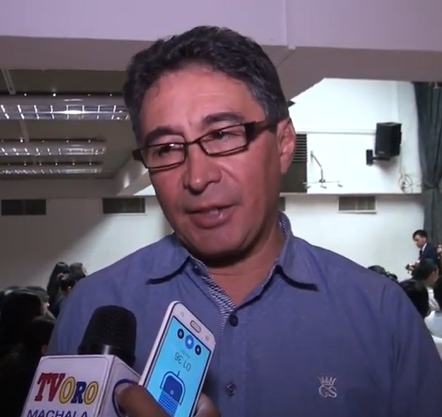Iván Petroff Rojas (Cuenca, 1956) is an Ecuadorian writer, poet, and educator known for his contributions to contemporary literature. A prominent figure in the “new Cuenca literature” movement of the 1980s, he has published a diverse body of work that includes poetry, short stories, and essays. His writings often explore themes such as mythology, magic, and music, with a focus on the depth of human experience. Notable works like En las formas del amor y la guerra (1989) and Fuego cruzado (2020) showcase his ability to blend cultural and social commentary with narrative art. Petroff Rojas has also been influential in the cultural scene of Cuenca, serving as the president of the Casa de la Cultura Núcleo del Azuay and teaching at the University of Cuenca. His dedication to literature and culture has made him a significant voice in Ecuadorian arts and letters.
Early Life and Education
Iván Petroff Rojas was born in Cuenca, Ecuador, in 1956. From a young age, he showed an interest in literature and poetry, influenced by his teachers Efraín Jara Idrovo and Alfonso Carrasco during his studies at the Benigno Malo school. It was in this academic environment that he successfully participated in various interscholastic literary competitions, fostering a deep love for the written word.
Literary Career
Petroff Rojas is part of the “new Cuenca literature” movement of the 1980s. He published his first book, El sueño del planeta (The Dream of the Planet), at the age of 21 in 1977, marking the beginning of a prolific literary career that encompasses poetry, short stories, and popular narrative. His work is characterized by a search for depth in words, exploring themes such as love, death, friendship, and solidarity, always with a sensitivity toward the ordinary and the simple.
Among his most notable works are Memoria 7 (1987), En las formas del amor y la guerra (In the Forms of Love and War, 1989), Cuerpos (Bodies, 2009), and Treinta cuentos fantásticos de pactos y encantamientos (Thirty Fantastic Tales of Pacts and Enchantments, 2016). His book En las formas del amor y la guerra revisits Greek mythology and incorporates elements of rock music and the 1960s counterculture, reflecting the freedom and challenges of the youth of that era.
In 2020, he published Fuego cruzado (Crossfire), a collection of jazz and blues stories that narrates the lives and origins of these musical genres. This work, which also addresses themes of discrimination and social exclusion, was presented by the publishing house CES-AL (Centro de Estudios Sociales de América Latina) and features a foreword by Dr. Bojana Kovačević Petrović. Fuego cruzado is a clear example of how Petroff Rojas uses literature to shed light on social and cultural aspects through stories of profound artistic experience.
Contribution to Culture and Education
In addition to his work as a writer, Iván Petroff Rojas has played a significant role in the cultural life of Cuenca and Ecuador. He served as president of the Casa de la Cultura Núcleo del Azuay and has been a professor of Language and Literature at the Faculty of Philosophy at the University of Cuenca. He also directed the film studies program at the same university. Petroff Rojas has led the Cultural Center “Demetrio Aguilera Malta” and presided over the 14th Edition of the Encounter on Ecuadorian and Latin American Literature “Alfonso Carrasco Vintimilla” in 2020.
Themes and Style
Petroff Rojas’s work stands out for its focus on themes such as magic, popular creativity, mythology, and music. His style is characterized by the rhythm of fantasy and the depth of his words, which seek to go beyond appearances. His characters often symbolize values, myths, and aspects of religiosity and cultural communication. Through his poetry, Petroff Rojas advocates for a fairer and more compassionate world, frequently addressing life and death, as well as the emotions and struggles of human existence.
Recognitions
Throughout his career, Iván Petroff Rojas has been recognized as an influential figure in Ecuadorian literature. His involvement in the Casa de la Cultura Ecuatoriana and his work as a university professor demonstrate his commitment to promoting and developing the arts and literature in his country. Additionally, his inclusion in the anthology Selección del nuevo cuento cuencano (Selection of the New Cuenca Short Story, 1979) alongside other renowned Ecuadorian writers solidifies his position as a prominent representative of Cuenca’s literary scene.
Videos
Selected Works
Poetry
- Memoria 7 (1987)
- Archipiélago Vital (2014)
- Cuerpos (2009)
Short Stories and Fiction
- El sueño del planeta (1977)
- En las formas del amor y la guerra (1989)
- Cuentos populares del Azuay (1995)
- Cien cuentos populares del Ecuador (2001)
- De amantes, brujas y perros encantados (2003)
- Cuentos fantásticos (2008)
- Treinta cuentos fantásticos de pactos y encantamientos (2016)
- Fuego cruzado: Relatos de jazz y blues / Crossfire: Jazz and Blues Stories (2020, bilingual edition with translation by Bruno Castillo. Read it for free here.)
- As de corazones solitarios (2000)
Essays and Literary Criticism
- Arte y lenguaje I: grandes temas del arte y la literatura universales con actividades de expresión oral y escrita
- Arte y lenguaje II: Ecuador y América Latina con actividades de expresión oral y escrita
- Expresión oral y escrita (2002)
Anthologies and Other Works
- Literatura y arte en Ecuador y América Latina: talleres de lenguaje y creatividad (1997) (Co-authored with Ana Lucía Montesinos)
- Casa de la Cultura Núcleo del Azuay para niñas y niños (2016) – Director of publication
- Selección del nuevo cuento cuencano (1979) – Included as part of an anthology with other authors.
Notable Collections
- Versos perversos (2010)
- El amor en 25 distancias (2001)

